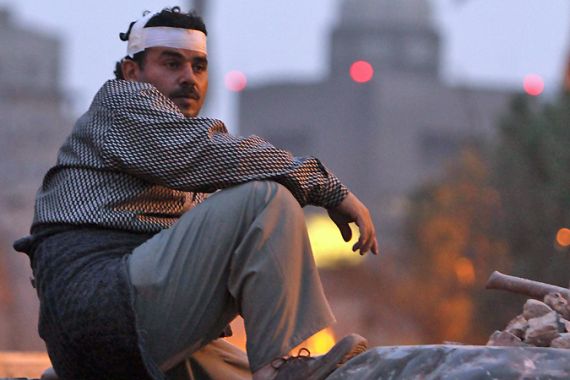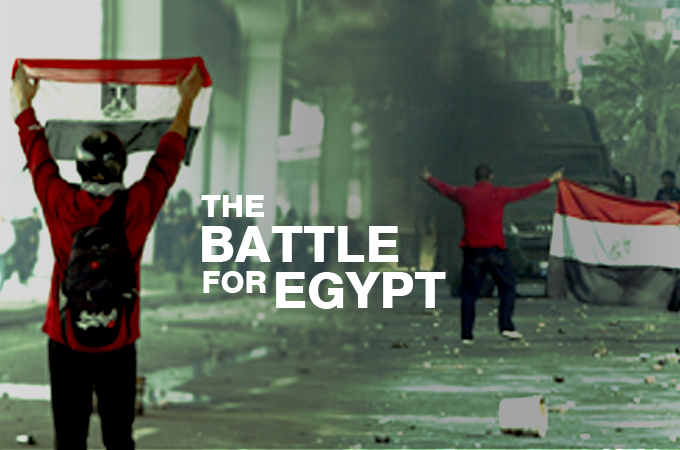Tense calm in Tahrir Square
Uneasy standoff follows clashes between pro-democracy protesters and Mubarak loyalists in central Cairo.

| There have been running battles between pro-democracy protesters and loyalists of Hosni Mubarak |
There is a tense calm in Cairo’s Tahrir (Liberation) Square following clashes between pro-democracy protesters and loyalists of Hosni Mubarak, Egypt’s embattled president.
Earlier, the two sides fought running battles near the square, the epicentre of protests against Mubarak for the past 10 days, with witnesses reporting hearing the sound of gunshots.
An Al Jazeera correspondent, reporting from the scene, said it was not clear who was behind the firing.
On Thursday, Mubarak told Christiane Amanpour of ABC News that he would like to resign immediately but feared that Egypt would descend into chaos if he quit.
Mubarak said he was “fed up” with power and denied his supporters were behind the violence of the last two days.
The pro-democracy protesters have vowed a “day of departure” on Friday in which they will demand the president’s resignation.
There were sporadic clashes throughout Thursday, as the army fanned out to separate the two sides and allowed thousands more protesters to enter their camp in the square.
Al Jazeera’s online producer in Cairo said: “The battle for downtown Cairo on Thursday has taken on an almost medieval quality, with protesters erecting makeshift barricades and building homemade catapults to launch rocks at each other.
“Close-range combat ensued for several hours, with hand-to-hand combat near the barricades erected by pro-democracy protesters. Both sides threw hundreds of rocks back and forth.”
Pro-democracy protesters gradually pushed back Mubarak loyalists who had swarmed onto a nearby highway overpass where they had been pelting their rivals with objects.
Our producer said: “The pro-democracy group began a slow advance onto the bridge, which had earlier been cleared of pro-Mubarak forces by an army tank.
“The pro-democracy crowd briefly lost its high ground … but they regrouped, and their counterattack eventually pushed the pro-Mubarak group down to the Corniche, where they are now slowly retreating past the state television building.
“The contrast between both sides’ tactics is striking: The pro-democracy protesters have organised themselves, building walls and seizing strategic locations; the pro-Mubarak crowd has mostly advanced in a mob, hurling rocks and then retreating under return fire.”
Suleiman interview
Speaking to Egyptian TV on Thursday, Omar Suleiman, the vice president, urged the opposition Muslim Brotherhood to enter into a dialogue with the government.
Suleiman said: “We invited the Muslim Brotherhood … but they are hesitant … this is a very important opportunity that they should not lose.”
He said there must be an investigation into who was responsible for the ongoing crisis and that Mubarak’s son would not run for the presidency.
 |
| Click here for more on Al Jazeera’s special coverage |
A day earlier, Tahrir Square had witnessed fierce clashes, after Mubarak loyalists – some of them riding camels and horses – attacked the pro-democracy protesters.
Earlier on Thursday, Ahmed Shafiq, the Egyptian prime minister, made an unprecedented apology for Wednesday’s assault that turned central Cairo into a battle zone.
“Egyptian hearts are bleeding,” he said of the clashes in which at least 13 people were killed and hundreds hurt.
Shafiq said the attack on the anti-Mubarak protesters was a “blatant mistake” acknowledging that it was likely organised and promised to investigate who was behind it.
The pro-democracy protesters accuse the regime of organising the assault, using paid thugs and policemen in civilian clothes, in an attempt to crush their movement.
Egypt’s state news agency has reported that the prosecutor-general has banned travel and frozen the bank accounts of three former ministers of the government that was sacked over the weekend, including the interior minister who was responsible for police.
The prosecutor-general said he ordered the same restrictions against a senior ruling party official until security is restored in the country.
Journalists targeted
On Thursday, mobile operator Vodafone complained about the use of the network by Egyptian authorities to send messages to the people of Egypt.
In a statement, Vodafone said: “These messages are not scripted by any of the mobile network operators and we do not have the ability to respond to the authorities on their content.
| Map: Demonstrations in the heart of Cairo |
“Vodafone Group has protested to the authorities that the current situation regarding these messages is unacceptable.
“We have made clear that all messages should be transparent and clearly attributable to the originator.”
Foreign photographers reported a string of attacks on them by Mubarak supporters on Thursday near Tahrir Square.
The Egyptian army rounded up several journalists after they came under attack from supporters of Mubarak.
“There is a concerted campaign to intimidate international journalists in Cairo and interfere with their reporting. We condemn such actions,” PJ Crowley, the US state department spokesman, said in a statement issued via Twitter on Thursday.
The New York-based Committee to Protect Journalists said on Wednesday that violence against journalists was part of a series of deliberate attacks and called on the Egyptian military to provide protection for reporters.
Shahira Amin, a senior journalist at Nile Television, a government-owned network, walked out on Wednesday in anger that state TV was not broadcasting enough of the protests and clashes in the square.